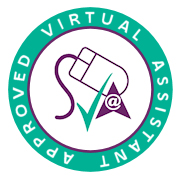When it comes to work I’ll admit I’m a bit of a ‘Monica’. Everything about my home office, PC, filing and storage must be in order to ensure I’m a productivity machine for my clients!
It’s a trait I’m actually quite proud off. I genuinely enjoy helping business owners become more organised, which often leads to them becoming more productive – a fab little bi-product! By having an organised office and PC, you have the ability to prioritise your workflow and delegate more effectively to your Virtual Assistant, freeing up your time to concentrate on business. After all, what’s the point in hiring a VA if you don’t have the time to brief them?
So I’m going to try to help you! Over my next few articles I’ll be sharing some organisation and productivity tips, which will help you become more efficient and therefore more productive.
Week 1: Organising your office
We’re going to start with your office. There’s no point in jumping right in with tips for PC and online organisation when your office is a war zone. Once you get stuck in it shouldn’t take too long, and it’s a sure-fire way to start being more productive today.
The first thing to do is walk into your office and observe it.
What do you see?
Unfiled paperwork? A cluttered or overflowing filing cabinet and desk drawers? Cables and wires peeping out? Stationery lying around? Empty coffee cups and yesterday’s lunch plate? Sticky notes stuck to your desk, walls, and monitor?
If even one of these relate to you, here’s what to do:
1. A clean slate.
First of all, clear your desk of everything except for your computer and phone (and printer if applicable). It may be some time since you’ve done this so you might want to grab a cloth and give your desk a bit of a clean once cleared, but I’ll leave that up to you!
Next go through everything that was on your desk. Put the important papers and documents to one side. Grab a pot or a cup to pop the stationery in. Get rid of dirty plates and cups. As for all those sticky notes, go through them and put the-still-relevant ones to one side for now and I’ll help you with those when we look at PC organisation.
And for everything else that’s lurking around, consider when you last used it? Depending on your answer will determine what you do with it.
2. Tackle those filing cabinets and drawers.
Ok so this is the most time-consuming task. But believe me it’ll be worth it – how do you find anything in those drawers anyway?
Invest in hanging folders, folders and dividers and start organising. Use the dividers to break up sections i.e. Finances, Team, Legal Docs, General Admin, etc. Then within those sections use folders for sub-categories e.g. Expenses, Taxes, Sales etc.
Next come up with a ‘system’ for finding the document again in 12 months time. Colour coding or alphabetical order are common ones, but it just has to be something you’ll remember and stick to.
Finally make sure each folder is clearly labelled and start placing your paperwork inside (don’t forget to file all the paperwork that was lying around on your desk and floor space). It’s going to feel great when you’re not hunting around for hours for that last tax assessment you urgently need!
3. Daily desk organisation.
Now you’ve got your desk cleared and all your paperwork filed away, it’s important you don’t end up back at square one a week later.
For those projects you’re currently working on, get an in-tray and out-tray set up on your desk. Whilst you’re working on a task, keep any related files in the in-tray. Then when you’re finished pop it in the out-tray to file at the end of each day or week. Just make sure you do it!
4. Rogue cables & wires.
If you haven’t moved across to wireless devices yet you’re likely to have quite a rogue wires and cables. Use cable ties to bind wires together and feed them through desk holes down behind your desk to the plug socket.
If you’ve got multiple plugs, use a power-surge protected power socket to contain all the plugs and wires in one place safely.
Finally if wires running across your office floor are unavoidable, tack them against the floor walls so they’re less likely to be tripped over.
5. Recycling & waste.
This often gets overlooked. But since most of us like to do our part to help the environment, make it easier on yourself by having both a waste bin and a recycling bin in your office.
Then when your ‘waste’ recycling papers build up you’ve got somewhere to put them!
And that’s all there is to it!
Now your office is organised I guarantee you’ll become more productive, if only for the simple reason that you know where everything is, and there are no distractions.

Leave a Reply